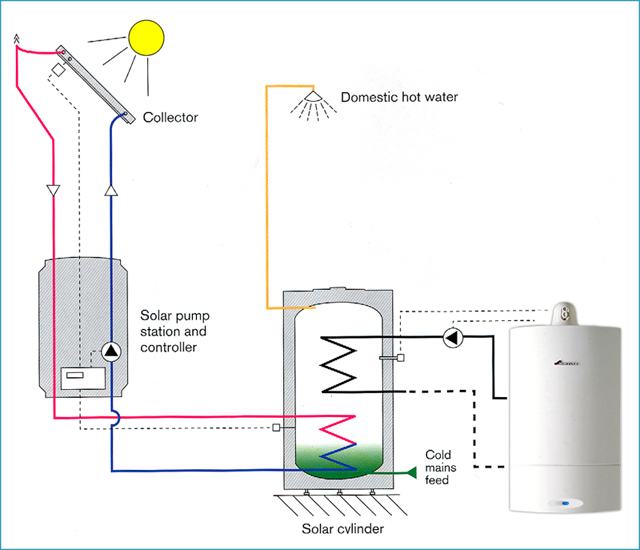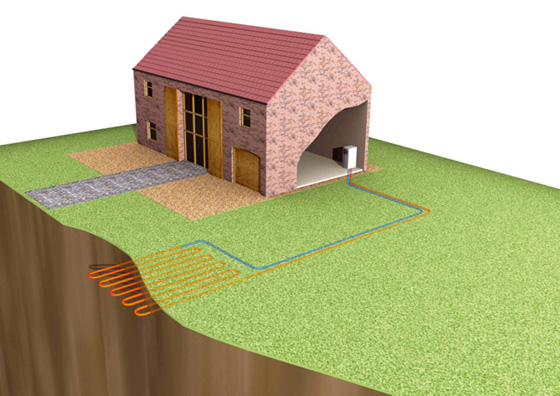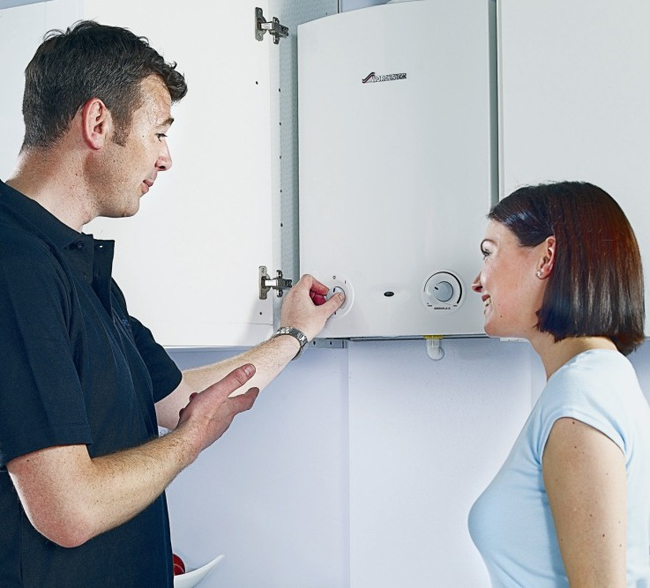The solar panels we supply are made specifically for the UK market and work on light absorption as opposed to just heat from the sun. These panels will provide 50-70% of all your hot water requirements throughout the year.
FAQS – SOLAR HOT WATER
How does it work?
Solar panels are ideally located on a south facing roof, although west and east will provide 85% of the benefit of a true south facing facade. A typical system will comprise of two, 2mtr x 1mtr panels giving a collection area of 4sq metres.
The heat is collected in the panels and pumped through pipe work down to your hot water cylinde, (if you don’t already have a dual coil cylinder, one would need to be installed). The heat from the panels travels through the coil in the cylinder and gives up it’s heat to the hot wate, it then travels back up to the roof to be reheated. this circuit is a sealed loop, filled with an antifreeze mixture of glycol and water. The integrated control unit ensures the panels only send their heat to the hot water cylinder when the temperature on the roof, is higher than the temperature of your stored hot water. When the temperatures equal’s out, the pump stops circulating the antifreeze.
Solar panels only heat your hot water and not heating.
How effective are they?
A typical system should be able to provide all your hot water in the summer months and varying degrees throughout the winter. Worst case scenario being approx 20% on the worst days the British weather can muster.
Will it work with my existing heating boiler?
Yes. Providing it is a regular boiler, or system boiler i.e. you have a copper, or stainless steel hot water cylinder (normally found in the airing cupboard)
Combination boilers are not suitable for a solar installation, as you have no hot water cylinder.
Do I need planning permission?
Planning regulations have been relaxed and in most cases are not required. It is advisable to check with your local council, especially if you live in a conservation area or listed property.
What is the typical cost of having them supplied and installed?
The panels we have installed to date, would average out at around the £4,000 – £4,500, including replacement twin coil copper cylinder.
How long do they last and what guarantee is there?
The panels would be expected to last 20 – 30years.
We are accredited installers, so we are able to offer an extended 5 year parts, and labour warranty as standard.
Are they cost effective and what is typical payback time?
As fuel prices for gas, oil and LPG have increased the payback time has dropped dramatically and according to independent reports. As fuel prices are set to rise over the coming years your payback time reduces significantly. At the end of the day something for free is always free and as fuel prices increase so do your savings.

FAQS – GROUND HEAT PUMPS

What are ground source heat pumps?
A ground source heat pump system takes energy from the ground and raises it to a higher temperature, in a process similar to a reverse refrigeration process. I.e. unlike a domestic fridge that removes heat from a product, which then rises from the back of the fridge. A ground source heat pump removes the heat from the ground then instead of dissipating, it is captured, condensed to a higher temperature and utilised to provide heat and hot water in the home.
How does it work?
A ground source heat pump consists of a collector (sometimes called heat exchanger), which normally has of a series of sealed, looped pipes either buried vertically, or horizontally in the ground. If space and ground conditions allow, then bore holes can be used instead. The collector is filled with a water/glycol mixture, that is circulated through the loops and the ground source heat pump unit, where it goes through the reverse refrigeration process described above. The heat is then used to heat your water, or provide hot water to your radiators, or underfloor heating.
Because the temperature the unit generates is lower than a conventional heat source, under floor heating is the preferred choice for your heating requirements. Where this is not practical, larger than normal radiators can also be used.
If your property is not a new build and you are looking at installing a ground source heat pump into an existing property, consideration must be given to improving insulation and draught proofing, to ensure comfort levels and maximum efficiency are achieved.
Electricity is the only energy required to power this type of system, i.e. the pump that circulates the glycol water solution, the more efficient the unit, the more heat will be obtained from the same amount of electricity.
The design of the system is the key element to ensure you maximise the heat harnessed.
We use a comprehensive design package, which uses property and land information in conjunction with historical weather conditions. This allows us to tell you what your annual energy consumption and operational costs are likely to be, as well as payback time and installation costs.
How effective and efficient are they?
A correctly designed ground source heat pump will provide all your heating and hot water requirements.
Commonly, ground source heat pumps work at an efficiency ratio of 1:5, which means that for every kw of electrical pump energy used, 4 or 5 kw of heat is produced i.e. the system is 400 – 500% efficient. By comparison, a modern gas, or oil condensing boiler runs at 90-94% efficient.
What is the typical cost of having them supplied and installed?
Prices can vary due to the individual nature of each property. As a guide, the ground source heat pump unit could be supplied and fitted from as little as £8,000 – £10,000 – this excludes ground works.
How long do they last and what guarantee is there?
The loop would be expected to last 100 years and the ground source heat pump unit would have a typical life span of 20 years.
As accredited installers, we are able to offer a extended 5year Parts and labour warranty as standard.
Are they cost effective and what is typical payback time?
As fuel prices for gas, oil and LPG have increased, the payback time has dropped dramatically and dependant upon individual conditions, could be as little as 3 years. If fuel prices rise, your payback time reduces.
Typical example
Client X had electric storage heaters and a gas boiler for all hot water and heating requirements, at an annual cost of £2,700. This was replaced with a ground source heat pump and radiators.
Installation: £13,800
Grant: – £2000
= £11,800
Annual running costs for all heating and hot water = £900
Previous running costs (electric storage heaters) = £2,700
Annual saving of £1900 giving a payback time of approximately 6 years based on current gas/oil prices.
FAQS – GAS, LPG AND OIL FIRED BOILERS
What is a condensing boiler?
A condensing boiler is one which makes more of the energy it runs on by using the heat normally expelled through the flue. By converting over 90% of the fuel used (rather than 50% in the case of some boilers) a condensing boiler makes your fuel go further- saving you money and helping to reduce your carbon footprint
What is a combi boiler?
Combi is short for ‘combination’ it refers to the way this type of system serves as both a central heating boiler and a hot water heater. This means there’s no need for a cold water header tank, normally situated in the loft, or a hot water storage tank (cylinder)as hot water is provided straight from the mains. Hot water is available on demand as and when you open the tap.
These boilers are not suitable for using in conjunction with solar panels as there is no means of storing hot water.
What is a regular boiler?
A regular boiler is fed from two cold water storage tanks( normally found in the loft) one for feeding the heating and one for feeding the hot water. So unlike a combi system, you have to wait for hot water and space in the loft and airing cupboard is required for the tanks.
This system can be combined with solar panels.
What is a system boiler?
Iike a regular system, this uses stored hot water. But because the water is pumped from the boiler straight to the radiators and hot water tank it’s a faster, more economical system to run. What’s more many of the components of the system are built in making it easier, quicker and more affordable to install.

